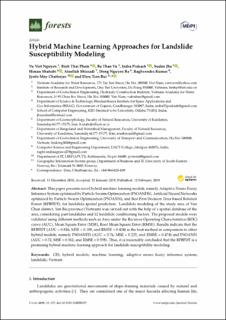Hybrid Machine Learning Approaches for Landslide Susceptibility Modeling
| dc.contributor.author | Nguyen, Vu Viet | |
| dc.contributor.author | Pham, Binh Thai | |
| dc.contributor.author | Vu, Ba Thao | |
| dc.contributor.author | Prakash, Indra | |
| dc.contributor.author | Jha, Sudan | |
| dc.contributor.author | Shahabi, Himan | |
| dc.contributor.author | Shirzadi, Ataollah | |
| dc.contributor.author | Nguyen Ba, Dong | |
| dc.contributor.author | Kumar, Raghvendra | |
| dc.contributor.author | Chatterjee, Jyotir Moy | |
| dc.contributor.author | Tien Bui, Dieu | |
| dc.date.accessioned | 2020-03-16T13:27:24Z | |
| dc.date.available | 2020-03-16T13:27:24Z | |
| dc.date.created | 2019-01-29T11:50:56Z | |
| dc.date.issued | 2019 | |
| dc.identifier.citation | Forests. 2019, 10 (2). | en_US |
| dc.identifier.issn | 1999-4907 | |
| dc.identifier.uri | https://hdl.handle.net/11250/2647010 | |
| dc.description | Licensee MDPI, Basel, Switzerland. This article is an open access article distributed under the terms and conditions of the Creative Commons Attribution (CC BY) license | en_US |
| dc.description.abstract | This paper presents novel hybrid machine learning models, namely Adaptive Neuro Fuzzy Inference System optimized by Particle Swarm Optimization (PSOANFIS), Artificial Neural Networks optimized by Particle Swarm Optimization (PSOANN), and Best First Decision Trees based Rotation Forest (RFBFDT), for landslide spatial prediction. Landslide modeling of the study area of Van Chan district, Yen Bai province (Vietnam) was carried out with the help of a spatial database of the area, considering past landslides and 12 landslide conditioning factors. The proposed models were validated using different methods such as Area under the Receiver Operating Characteristics (ROC) curve (AUC), Mean Square Error (MSE), Root Mean Square Error (RMSE). Results indicate that the RFBFDT (AUC = 0.826, MSE = 0.189, and RMSE = 0.434) is the best method in comparison to other hybrid models, namely PSOANFIS (AUC = 0.76, MSE = 0.225, and RMSE = 0.474) and PSOANN (AUC = 0.72, MSE = 0.312, and RMSE = 0.558). Thus, it is reasonably concluded that the RFBFDT is a promising hybrid machine learning approach for landslide susceptibility modeling. | en_US |
| dc.language.iso | eng | en_US |
| dc.rights | Navngivelse 4.0 Internasjonal | * |
| dc.rights.uri | http://creativecommons.org/licenses/by/4.0/deed.no | * |
| dc.title | Hybrid Machine Learning Approaches for Landslide Susceptibility Modeling | en_US |
| dc.type | Peer reviewed | en_US |
| dc.type | Journal article | en_US |
| dc.description.version | publishedVersion | en_US |
| dc.rights.holder | © 2019 by the authors. | en_US |
| dc.source.pagenumber | 27 | en_US |
| dc.source.volume | 10 | en_US |
| dc.source.journal | Forests | en_US |
| dc.source.issue | 2 | en_US |
| dc.identifier.doi | 10.3390/f10020157 | |
| dc.identifier.cristin | 1667346 | |
| cristin.ispublished | true | |
| cristin.fulltext | original | |
| cristin.qualitycode | 1 |
Tilhørende fil(er)
Denne innførselen finnes i følgende samling(er)
-
Institutt for økonomi og it [162]
-
Publikasjoner fra CRIStin [3727]

